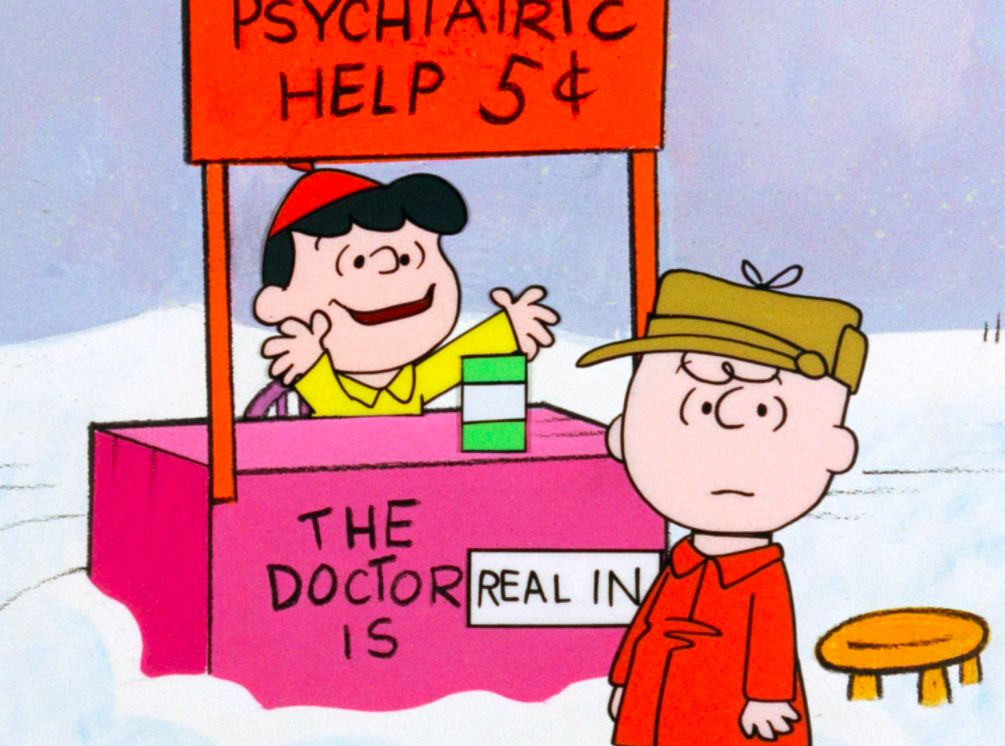A Moment at Lucy’s Therapy Booth
Peanuts, the comic strip written by Charles Schulz from the 1950 until 2000, remains my favorite. I am grateful to my wife who found me a vintage Snoopy-as-professor, my go-to neckwear when recording lectures.
In the vast Peanuts collection is classic scene from “A Charlie Brown Christmas.” A melancholy Charlie Brown plops down at therapist Lucy’s booth to explore what is bothering him. After collecting her five-cent fee, with glee, Lucy offers diagnostic terms to help Charlie name his ailment.
Lucy: Are you afraid of responsibility? If you are, then you have hypengyophobia.
Charlie: I don’t think that’s quite it.
Lucy : How about cats? If you’re afraid of cats, you have ailurophasia.
 That scene came to mind as I reflect on what ails our nation. I wonder how to label the sense of disconnection manifest in so many public spaces. I looked up phobias and disorders to prick my imagination. So many interesting words. And yet I also felt called to coin a few neologisms myself.
That scene came to mind as I reflect on what ails our nation. I wonder how to label the sense of disconnection manifest in so many public spaces. I looked up phobias and disorders to prick my imagination. So many interesting words. And yet I also felt called to coin a few neologisms myself.
Politicophobia is the unreasonable fear of politics or politicians. If we could remove the word “unreasonable,” politicophobia might be a phobia in the mix of germs.
I wondered if there was a word for “fear of community,” so evident in the political right’s equation of communism, tyranny, and any sort of collectivism (mask-wearing makes me is a “sheeple”). The fear or rejection of the essentially communal nature of humankind is also evident in controversies regarding wearing masks and getting vaccines.
Anyone who has seen the demonstrations of how we actually conspire (conspire means to breathe with; have you seen those pictures of how far a cough or sneeze travels?) together should have been convincing. Instead, a significant minority of the population harangues Walgreens employees for not carrying a horse drug and causes shortages at farm stores of the same drug.
I thought maybe koinoniaphobia might be a word: the fear of koinonia (an essential word in the New Testament for Christians, being partners in community with Christ and with each other). But the closest word is koinophobia, which means fear of living an ordinary life. I know that fear! But that is not the root of our national disease.
There is philophobia, which is fear of love or of friendship or of romantic relationships. That’s not it, either, but—again—if this fear can include fear of having a friendship with someone who has opposing views and your other friends would disown you if you are seen, in person or online, with this friend, well, then maybe there is some load of philophobia.
Xenophobia, the fear of strangers or the fear of the other, seems an obvious choice. And we’ve done an excellent job of creating “others” to fear! One would think there really are Children of Light (God) and Children of Darkness (Satan) with completely different creators, souls and DNA, rather than a single species sharing 99.9 percent of our DNA in common and about half of the nation claiming a creation story of one God creating us all. But can we apply xenophobia to the fear of sons and daughters, of cousins, of in-laws, of parents who hold “the wrong” political views?
Alethophobia (not a neologism) is the fear of truth. Yes. Oh, yes. A heavy viral load of that.
How about irenephobia (neologism)? The fear of peace. Now, you might question that anyone fears peace. But, given the level of conflict in our nation, and the truism that we are organized for the results we are getting, it would seem we don’t want deep peace, real shalom.
One last phobia: isophobia, the fear of equality (that is a neologism, but barely, because there are many articles and essays on the topic). We Americans claim to LOVE our FREEDOM but we have far less affection for acknowledging the same scope of freedom for everyone. We trumpet the idea of equality from the Declaration and the Gettysburg Address, but equality terrifies those with power or they would not be fighting so viciously against it.
Moving out of the phobias, we also might consider the disorders. Failure to attach rings partially true. Some people are unable to form a meaningful, compassionate attachment to anyone else. Is that number growing? I don’t know the research, if there is such research, but if I were to guess, I’d guess “yes.” Escalating crime, gun sales, gun violence, and suicides since the start of the pandemic—are these pandemic-driven or more persistent and powerful trends?
Or oppositional defiant disorder, a stance of anger, rejection, and violence toward anyone with authority. Picture the faces of the insurrectionists on January 6, or the red-faced spitting anger toward nurses, school boards, teachers, and grocery clerks regarding mask mandates. Sure looks like anger, rejection, and violence.
“Perfect love casts out fear,” reads 1 John 4:18. I’ll take a heavy viral load of that, please.
Dr. Gary Peluso-Verdend is president emeritus at Phillips Theological Seminary and is the executive director of the seminary’s Center for Religion in Public Life. The opinions expressed in this blog are those of the author. Learn more about the Center’s work here and about Gary here.


Comments are closed.